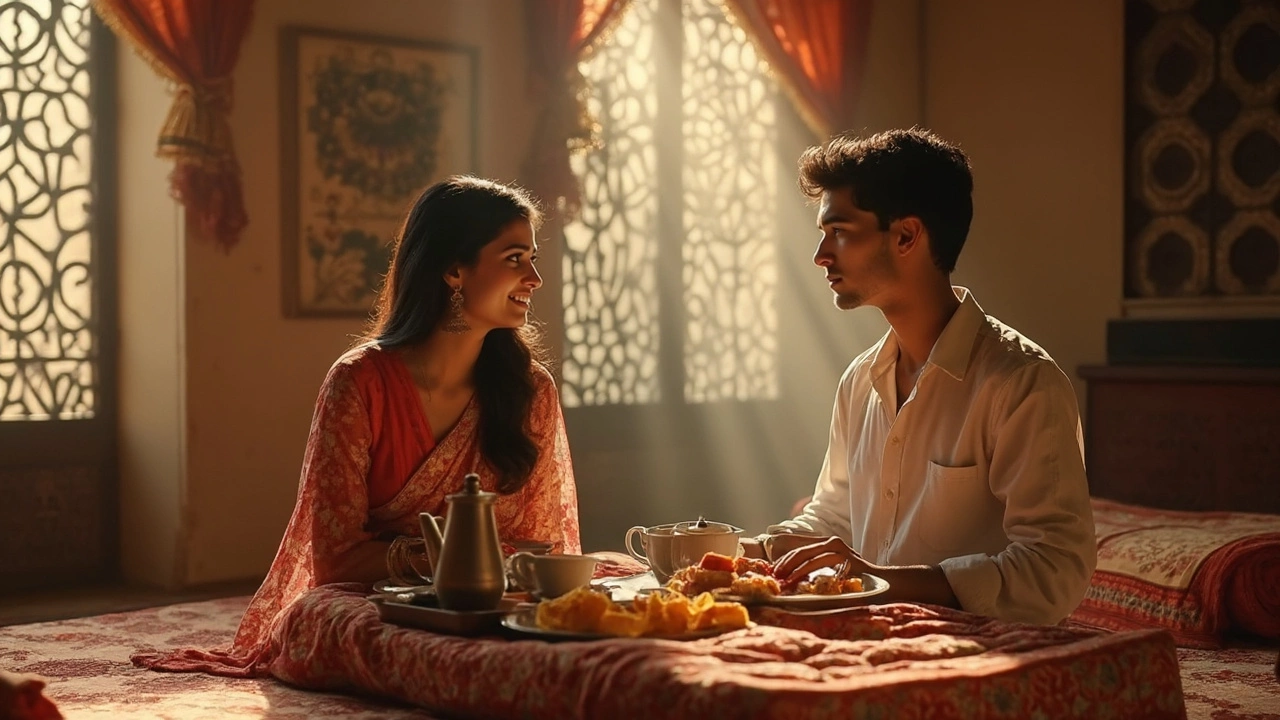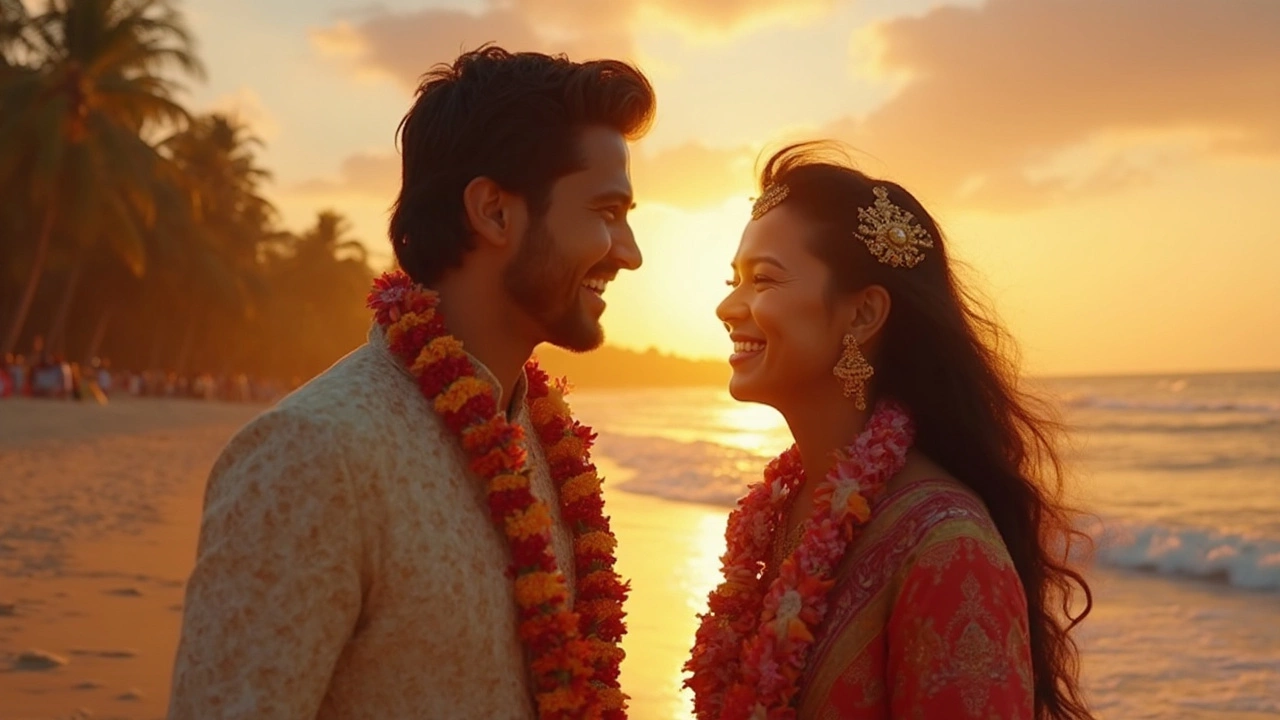Some couples step foot into their honeymoon suite and feel like they're living their own romantic movie. That jolt of instant chemistry? It can feel amazing—intense, exciting, maybe even overwhelming. But is that rush always a green light? Not always.
It’s easy to get swept up in the moment, especially with the tropical sunsets and clinking glasses. But sometimes, that super-strong connection can cover up real differences or red flags you’d spot in regular life. If you’re picking a honeymoon destination based on pure excitement or because 'it just feels right,' slow down and check in with yourself. Excitement is great, but you don’t want those first sparks to blind you.
Most people think of instant chemistry as proof that the relationship is meant to be. Sure, positive vibes are fantastic, but real connection goes deeper. Use your honeymoon not just for those steamy moments, but to see how you work together as a team. Watch how you solve little travel challenges—like missing luggage or new foods—and you’ll learn way more about your dynamic than a sunset kiss ever could.
- That Electric Spark—What’s Behind Instant Chemistry?
- Can ‘Love at First Sight’ Skew Your Honeymoon Plans?
- Red Flags Hiding Behind the Bliss
- How to Keep Your Feet on the Ground
- Making Your Honeymoon Meaningful, Not Just Magical
That Electric Spark—What’s Behind Instant Chemistry?
So what's really happening when you feel that instant pull toward someone, especially during your honeymoon? It’s not magic, even if it feels that way. Scientists say instant chemistry kicks in because of a combo of brain chemicals like dopamine and oxytocin, which are also known as the 'feel-good' hormones. These chemicals light up when there’s attraction, novelty, and excitement—which is exactly what you get when you’re visiting new honeymoon destinations with someone you’re into.
This spark often comes from both physical attraction and a sense of emotional connection. That’s why you might hear people say, “The second I met them, I just knew.” But, as psychologist Dr. Helen Fisher said, it’s about a lot more than just butterflies:
“That instant rush is your brain rewarding you for spotting someone who ticks off your biological boxes, but real relationships need more than a primal jolt.”
Ever notice how couples who feel they have ‘instant chemistry’ also tend to idealize each other, especially during trips? Vacation mode makes those vibes even stronger, dialing up excitement and lowering people’s guard. But there’s a catch—the stronger the initial high, the easier it is to miss warning signs or overlook differences. Fast attraction doesn’t always mean a lasting match.
If you’re wondering if your relationship is built on more than just sparks, pay attention to how you both act under pressure. A recent survey by Travel & Leisure showed that 61% of couples learn more about each other’s quirks and communication styles on their first trip together than at any other time. That intense chemistry? It can build a fire, but only teamwork keeps it burning.
- Instant chemistry is mostly driven by brain chemicals and first impressions.
- The excitement of new places can crank up those feelings.
- Watch for whether attraction is matched by real understanding and problem-solving together.
Don’t worry if you don’t feel fireworks right away, either. Some of the strongest bonds grow with time, not minutes. The real test? How you connect and support each other—beyond the first spark.
Can ‘Love at First Sight’ Skew Your Honeymoon Plans?
There’s this classic picture of honeymoon destinations—you arrive, everything’s magical, and the whole trip is just smooth. But if you’re basing your entire trip on that crazy rush of instant chemistry, watch out. It’s easy for couples caught up in ‘love at first sight’ mode to set super high expectations for their honeymoon that real life can’t match.
When you’re fueled by adrenaline (yep, science backs this up!), your brain tends to focus only on the good stuff. Researchers at Rutgers found that when people feel that instant spark, their brains light up like they’re falling in love—but also filter out red flags. That can lead you to pick destinations that look great on Instagram but might not match your real interests as a couple. You might skip the conversations about what you both actually want out of your getaway—like adventure versus chill time, or city versus beach—because you’re assuming you’ll just magically agree on everything.
If you’re planning your trip with ‘it’ll all work out because our connection is just that strong,’ you might run into surprises. Flights get delayed, suitcases go missing, and hotel photos lie. When reality doesn’t match fantasy, some couples get disappointed or even blame each other.
- Communicate your real hopes for the trip—don’t assume your partner wants exactly what you do.
- Choose your destination based on both your personalities. If one of you wants hiking and the other wants lounging, find a spot that does both.
- Plan for down time and some spontaneous moments, instead of packing every second because you want the ‘perfect’ story.
Here’s a quick look at this in action:
| Expectation Set By Chemistry | Reality Couples Face |
|---|---|
| Every day will be blissful and sexy | Jet lag, sunburns, or arguments over what to do |
| We’ll agree on everything | Different tastes in food or activities pop up fast |
Bottom line: loving that rush is fine, but don’t let it be the only engine driving your honeymoon plans. The best trips are based on who you both actually are, not just what your brain wants to believe in the first week of ‘instant chemistry.’

Red Flags Hiding Behind the Bliss
The rush of instant chemistry can feel so good it almost tricks your brain—literally. Research shows that early infatuation lights up the same areas of your brain that respond to sugar or even drugs. So, if your honeymoon is all butterflies and fireworks, pay attention: that extreme high might make you overlook real issues.
Don’t ignore it if real-life problems slip under the radar. Here are a few red flags folks often miss when basking in that newlywed glow at popular honeymoon destinations:
- Poor conflict skills: Instant attraction doesn’t mean you know how to handle disagreements. If you can’t talk through a travel hiccup without someone blowing up or shutting down, that’s worth noticing.
- One-sided decisions: If one person chooses all the activities or restaurants because “that’s just how they are,” it might signal bigger control issues back home.
- Lack of comfort: You should feel like you can truly relax, not just put on a happy face for Instagram stories. If awkward moments turn into arguments instead of laughter, something’s off.
- Ignoring boundaries: It’s easy to brush off little discomforts (“it’s our honeymoon, I want you all to myself!”) as sweet, but things like texting your friends or taking solo downtime are healthy—don't let anyone guilt-trip you for needing space.
For newlyweds, research from 2023 found that couples who only focused on the thrill actually reported lower happiness after the trip than those who mixed excitement with honest talks. Here’s a quick look at how priorities shaped post-honeymoon satisfaction:
| Honeymoon Focus | Relationship Satisfaction (1 month post-trip) |
|---|---|
| Only Passion/Excitement | 3.8/5 |
| Mix of Excitement & Open Talk | 4.6/5 |
If you spot any of those signs, don’t panic. The important thing is to notice and talk about them, instead of ignoring little things now that could grow into much bigger issues later. Remember, honeymoon destinations might set the mood, but real connection happens in daily moments, not just candlelit ones.
How to Keep Your Feet on the Ground
During your honeymoon, instant chemistry can feel like you’ve hit the jackpot. But don’t let the beach breeze and candle-lit dinners distract you from what matters long term. It’s really easy to get lost in the happy haze and ignore reality. So, how do you stay level-headed and make sure the spark is real?
- Talk about the tough stuff. Don’t only focus on the fun. Honest conversations about money, family, or even the dreaded “where do you see us in five years?” can tell you more about your winning streak as a couple than all the selfies you’ll ever take.
- Watch how you solve problems. Something will go wrong—it’s a given (missed flight, funky street food, or lost phone, anyone?). How you team up when things get tough is a huge indicator of your future. If you both handle stress well, that’s a green flag.
- Don’t skip the solo time. Take a walk on your own, read by the pool, or just soak in the view in silence. If instant chemistry is real, it’ll still be there even when you aren’t glued at the hip. Plus, you’ll recharge and come back feeling even closer.
- Share the trip planning. Team up for booking dinners, day trips, or even hotel upgrades. If one person is doing it all, that can quickly become a pattern back home too. Balance early, and you’ll avoid future squabbles.
If you're going all-in because of that instant chemistry, take a minute to check in with yourself. Does your partner really love the same things, or are you both just chasing the next high? Quick fact: a study from Stanford found that couples who focus more on teamwork than instant attraction end up happier in the long run.
Worried you’re seeing things through rose-colored glasses? Try writing down what matters most to you in a partner. Compare it to your real honeymoon experiences—not just the highlights. That honesty will help you spot if the red flags are hiding between all those Instagrammable moments.

Making Your Honeymoon Meaningful, Not Just Magical
Your honeymoon should be more than just Instagram-worthy sunsets and fancy dinners. Sure, those moments make great memories, but building something real together is what sticks with you long after you unpack. Instead of just chasing thrills or sparkly moments, use your trip to learn how you really click as a team in new environments.
Start by mixing up your plans. Don’t book every second with romance—make time for down-to-earth stuff. Maybe try navigating a public market in another language, or go on a hike where things might not go as planned. Psychologists say couples who solve problems together early on have stronger relationships down the road. Facing small challenges now gets you ready for bigger life stuff later.
- Share a daily “win and whine”—talk about the high and low points together before bed.
- Switch off planning: one partner picks breakfast, the other handles dinner.
- Capture not just pretty pictures but short diary clips or voice notes about what surprised you each day.
- Ask locals for tips rather than just sticking to touristy stuff—you’ll create stories instead of just following a guidebook.
It also helps to have a quick budget chat, even on your getaway. Money disagreements are the top reason couples argue on trips, according to a 2023 survey by Expedia. Setting up a rough daily budget keeps things relaxed and avoids stress later. Here’s a quick idea of where vacation cash usually goes:
| Expense | Average % of Honeymoon Budget |
|---|---|
| Accommodation | 40% |
| Food/Drink | 25% |
| Experiences/Tours | 15% |
| Transport | 10% |
| Other (shopping, tips, etc.) | 10% |
Stepping outside all the instant chemistry is key. Yes, keep the spark. But focus on real talk, shared laughs, and even the awkward moments. Those are the things that turn your honeymoon from a fleeting getaway into the start of something stronger and real.
